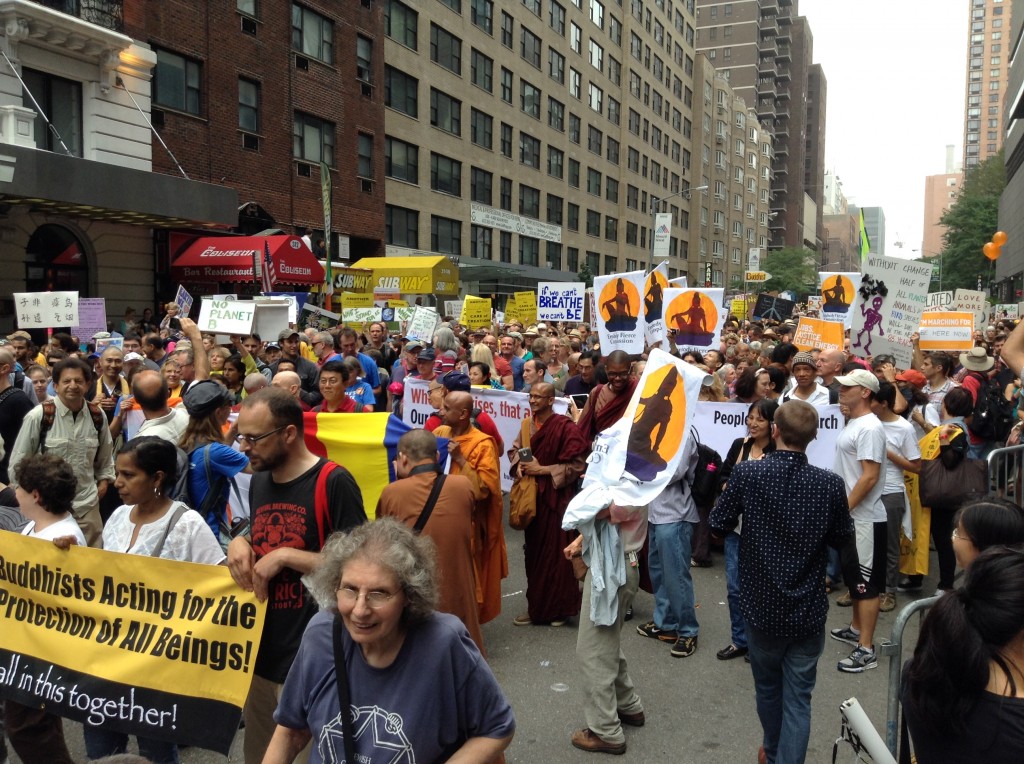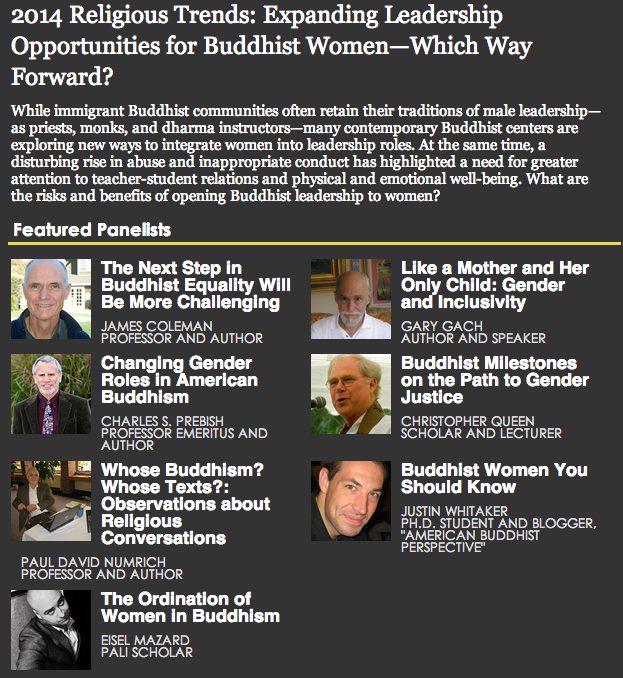 At his Wikipedia page, Brad Warner is described as “an American Sōtō Zen priest, author, blogger, documentarian and punk rock bass guitarist.” Trained and ordained by Gudo Wafu Nishijima in Japan, he is also the founder of Dogen Sangha Los Angeles.
At his Wikipedia page, Brad Warner is described as “an American Sōtō Zen priest, author, blogger, documentarian and punk rock bass guitarist.” Trained and ordained by Gudo Wafu Nishijima in Japan, he is also the founder of Dogen Sangha Los Angeles.
Brad is also the author of such dharma books as Hardcore Zen: Punk Rock, Monster Movies & the Truth About Reality; Sit Down and Shut Up: Punk Rock Commentaries on Buddha, God, Truth, Sex, Death, and Dogen’s Treasury of the Right Dharma Eye; Zen Wrapped in Karma Dipped in Chocolate: A Trip Through Death, Sex, Divorce, and Spiritual Celebrity in Search of the True Dharma; Sex, Sin, and Zen: A Buddhist Exploration of Sex from Celibacy to Polyamory and Everything in Between; and Hardcore Zen Strikes Again! In addition, he has authored the works of fiction Gill Women of the Prehistoric Planet and Death To All Monsters!, directed the documentary film Cleveland’s Screaming, released several albums with punk bands, and served as a co-commentator on Gudo Wafu Nishijima’s translation of the Fundamental Wisdom of the Middle Way: Nagarjuna’s Mulamadhyamakakarika. He is also the subject of the new documentary film Brad Warner’s Hardcore Zen.
Brad’s new book is There Is No God and He Is Always With You: A Search for God in Odd Places, about which Publishers Weekly says:
…[Warner] momentarily sets aside his punk weapons of iconoclasm and takes a more respectful, even reverential tone to a perennial question: does God exist? As a practicing Zen Buddhist, his way of considering this question is entangled in oft-misunderstood concepts such as enlightenment. Warner never shies away from such complications; instead, they become grounds where the Western understanding of God and the Buddhist approach to reality and experience meet.
Brad is a friend and has been a guest at University of the West (where I teach), and so when Kim Corbin at his publisher New World Library asked me if I wanted a review copy of the new book and some professional time to pick Brad’s brain I jumped at the chance. Below is our email, which we did via email with Kim’s help.
*
Brad, why write about God at all? And why write about God right now?
I’ve been interested in God as long as I can remember. I wasn’t raised in a religious environment. So I first heard about God from other kids at my school who were religious. I found the idea fascinating. I wondered if it could possibly be true or if it was just like Bart Simpson said, “an idea grown-ups invented to scare kids, like the Boogey Man or Michael Jackson.” As I got older I never lost my fascination with God. When I was 18 I met a Zen teacher who often explained Zen philosophy in terms of God. He’d been raised Catholic. I didn’t know at the time that it was weird to talk about God in Buddhist terms. But his ideas about God made sense to me, whereas the other ideas I’d heard about God just seemed like fairy tales.
I think right now we need to talk about God because it’s an important topic. Whether you believe in God or not, you’re affected by the idea of God. People are willing to fight and die over their definitions of God. It’s not something we can ignore. We need to know what we’re talking about of we ever hope to have any real dialogue on the subject. And I think we have to have dialogue on the subject. We can’t continue just yelling “Yes! He exists!” “No! He doesn’t!” back and forth at each other imagining that whoever shouts the loudest is going to win in the end. It doesn’t work like that.
You talk about the uneasiness that some, including Buddhists, have with the word “God.” How do we become more comfortable with the word and the ideas wrapped up in it?
I don’t think we need to become comfortable with it. I used the word God because it’ such an uncomfortable word. It forces you to respond in some way. And I think that’s a good thing.
Too many people in Buddhism are too averse to conflict. We have these ideals about peace and harmony and community, which are all great ideas. But real peace doesn’t come by simply hiding ourselves away from anything that has to do with conflict. We need conflict. We just need to be able to have conflict without actually harming each other. But even the idea of doing no harm can be misconstrued when we decide that we have to make everybody we meet feel nothing at all. Sometimes a little bit of what some might call harm is a good thing if we approach it in the proper spirit.
The ideas wrapped up in the word God are often contentious and controversial. But that’s OK. We need to get through these arguments in order to find out where we really stand.
I mean, we’ve got one side that says, “Kill everybody who disagrees with me!” Then you’ve got the other side that slinks away and says, “I will maintain peace and serenity by never engaging with anyone I disagree with.” They’re actually both doing exactly the same thing, which is running away from conflict. You could argue that the ones who refuse to engage with others do less harm. But really, they just put off doing harm until later.
 You write, “In my opinion it’s entirely wrong to say that Buddhism is a religion without a God. It’s quite the opposite. To me Buddhism is a way to approach and understand God without dealing with religion.” Can you help us understand what you mean by this?
You write, “In my opinion it’s entirely wrong to say that Buddhism is a religion without a God. It’s quite the opposite. To me Buddhism is a way to approach and understand God without dealing with religion.” Can you help us understand what you mean by this?
I feel like religion is where you have all the answers. Even atheism can be a religion when it says it has the answer and the answer is there is no God. It’s the same as saying there is a God and he’s exactly the way I say he is. Buddhism doesn’t provide answers. It’s able to say, “I don’t know.” But it doesn’t say “I don’t know” because it’s confused. It says “I don’t know” because “I don’t know” is the proper answer to some questions. It’s the proper answer to a lot of questions! Maybe most of them!
God is the biggest question of all. And the only answer is “I don’t know.” Even God doesn’t know about God. There’s nothing to know and no one to know it!
By “approaching God” I mean it’s a way of asking those big questions like “Why are we here?” and “What is the purpose of life?” without ever accepting any easy answers. We think every question needs an answer. But maybe they don’t. Or maybe the answer is to say, “I don’t know” with complete conviction.
Buddhism isn’t a religion without God. It doesn’t have a belief in a creator deity. It doesn’t believe in a big man in the sky with a beard who sends lightning bolts down to smite his enemies. But it doesn’t say that this universe is just a conglomeration of dead matter either. Life has meaning even if we’ll never completely understand what it means. We just have faith that there is a meaning. I think that kind of faith is what a lot of religious people call “God’s will.” Maybe that’s as good a definition as any other.
Brad, in the promotional material for the book, you talk about mostly agreeing with Richard Dawkins, Christopher Hitchens, Sam Harris — the “New Atheists” — with the caveat that “the God that they’re spending so much energy denouncing isn’t the kind of God I believe in.” Another criticism that others, like Chris Hedges, have made of the New Atheists is that their atheism is a fundamentalist atheism that is no less close-minded and dangerous than explicitly religious fundamentalism. What are your thoughts on this?
I think Chris Hedges is correct. A lot of the Neo Atheist movement is just as dogmatic as any fundamentalist religion. It’s a shame that it’s that way because I think a lot of what they’re saying in the atheist movement is true. We do need to get rid of this dogmatic idea of a man-like God in the sky who loves one set of people better than others, who provides us with an excuse to act in the worst possible way toward each other. That’s obviously nonsense. But it’s no good to replace one dogma with another. If you do that you end up no better off than you were before. You become just as elitist as the religious fundamentalists.
I don’t think all of the current crop of atheists are like this. I’ve heard that Sam Harris says he believes in God. But I’ve also noticed that he’s stopped saying this. At the time I was writing my book there was a lot of advance publicity for a book that Sam Harris was going to come out with about his ideas about God. I expected his book to appear about the same time as mine did. But it never came out and all the publicity about it appears to have shut down. I wonder if he felt too much pressure from his more dogmatic atheist fans to continue talking about God. I don’t really know. But I suspect the fundamentalist elements within that movement might be just as powerful as the fundamentalists in any religion. They don’t like heresy and they’ll force heretics to recant their position or face punishment just like any other inquisition.
What’s on your mind these days? What might the next book explore?
I don’t know for sure. But as I’ve been traveling and talking about the new book I’ve found myself engaged in a lot of really interesting discussions. This idea of God really brings up some strong feelings in a lot of people. As I’ve spoken to them I’ve found my own ideas about God are shifting and changing. You never know what people really think about controversial topics until someone is willing to bring them up for discussion. Then you get to see what sorts of ideas are actually out there, unexpressed because people have been afraid to talk about them for so long. It’s pretty amazing. Maybe I’ll write a book about that!











